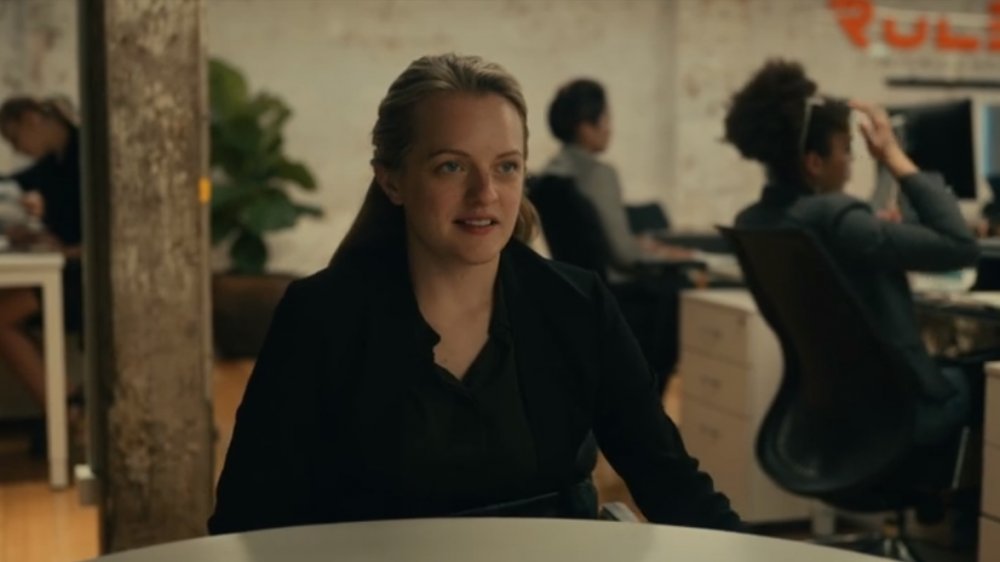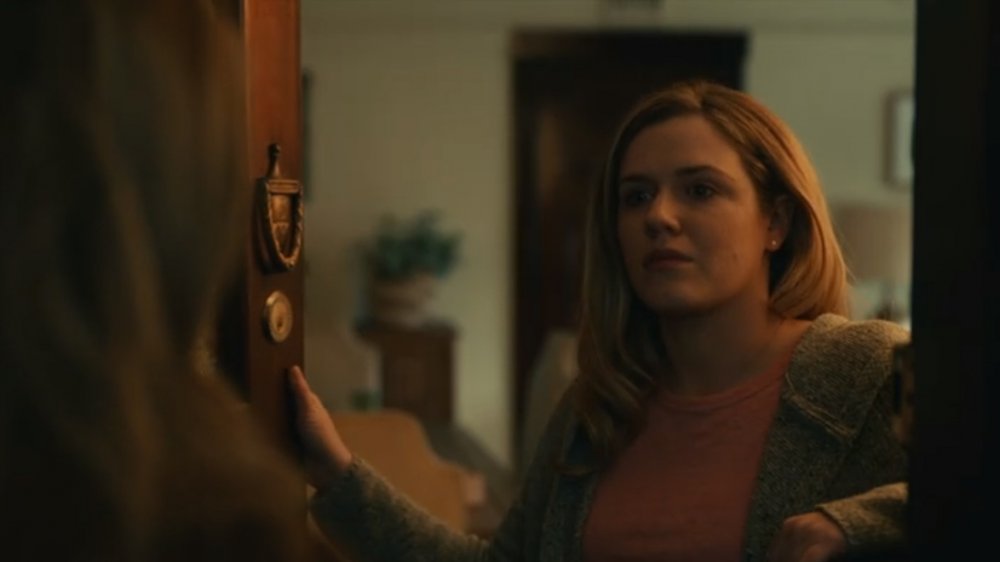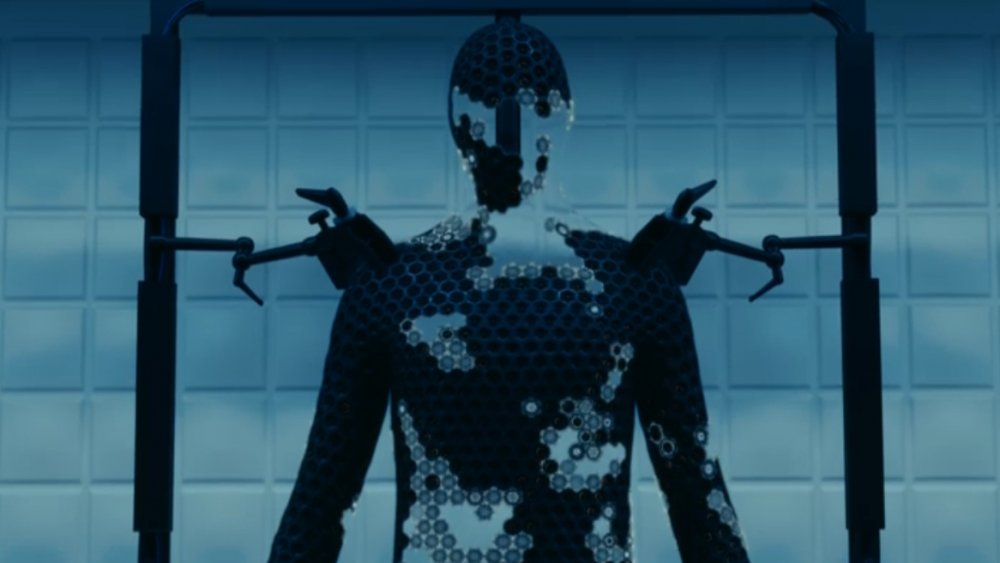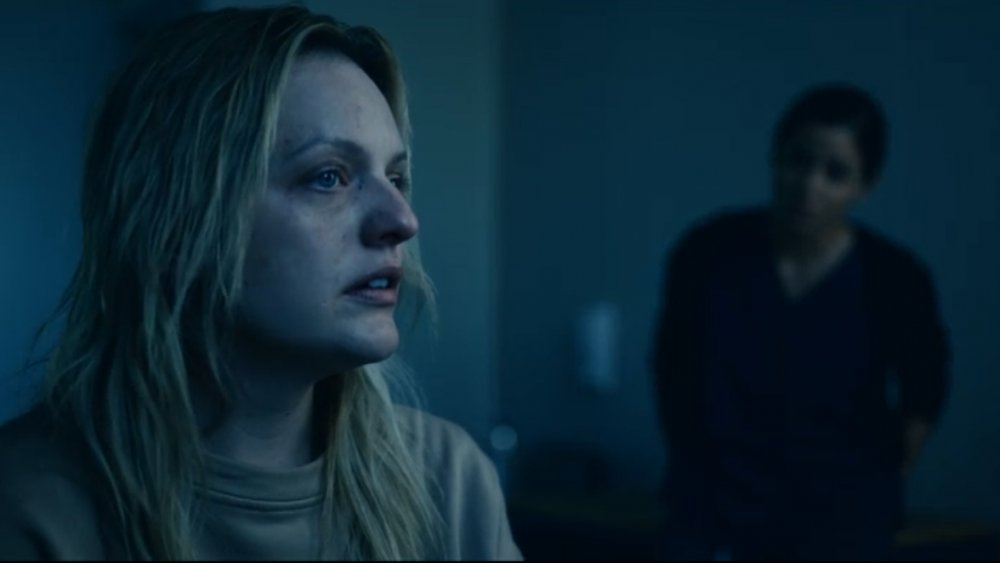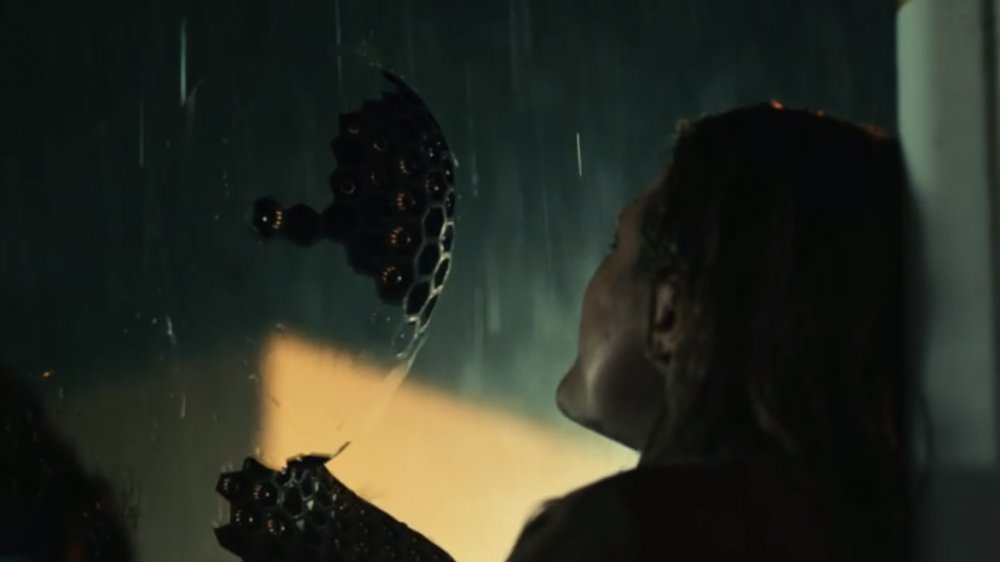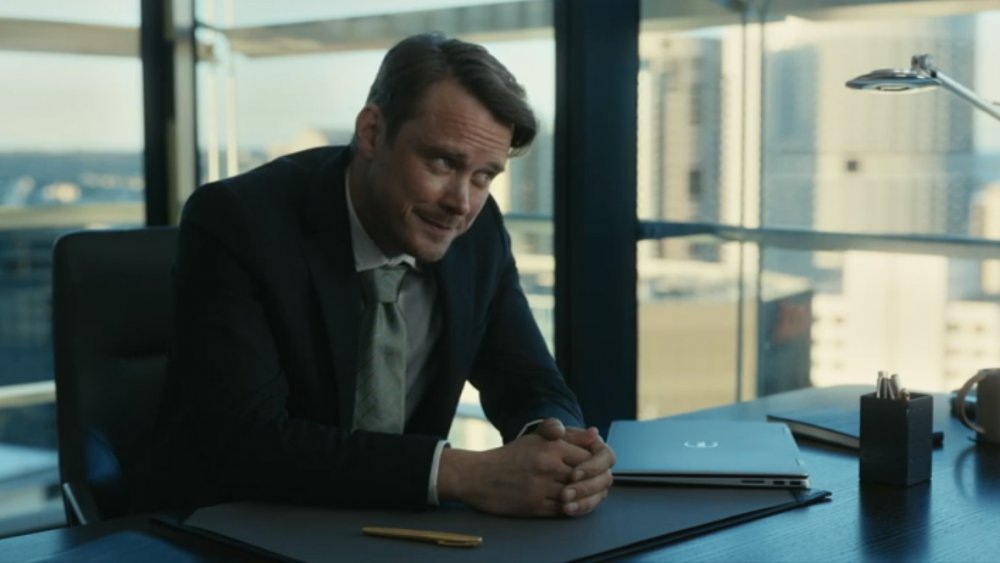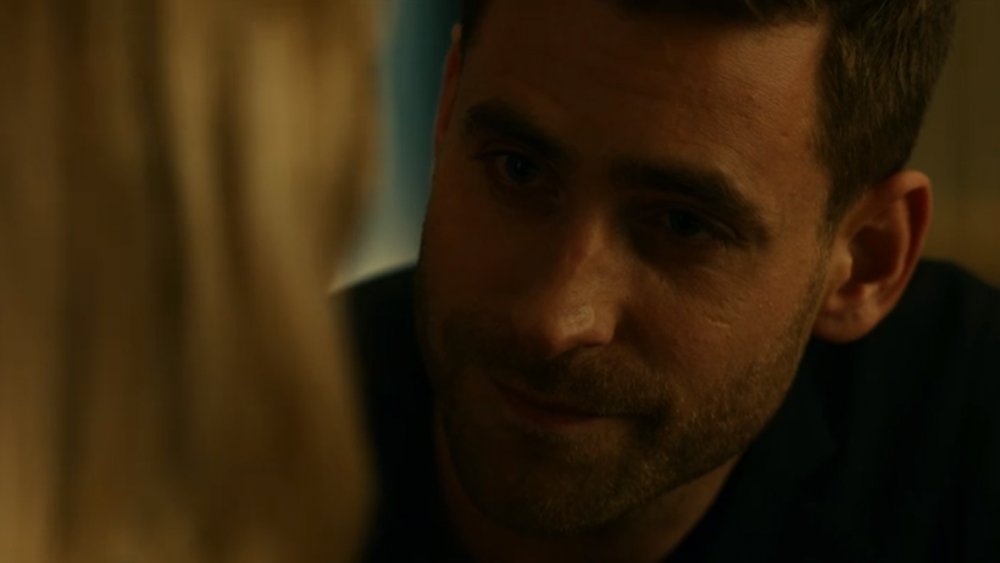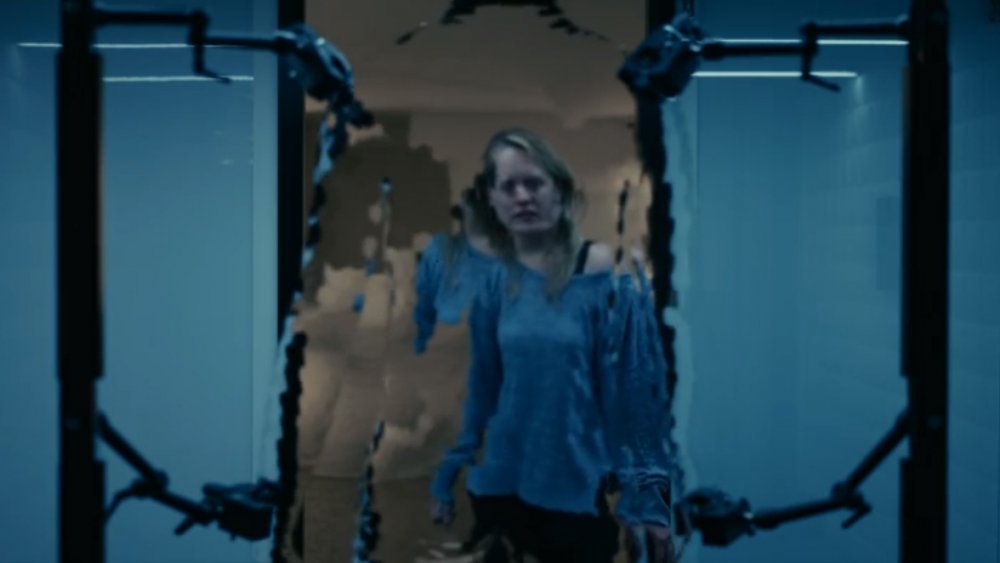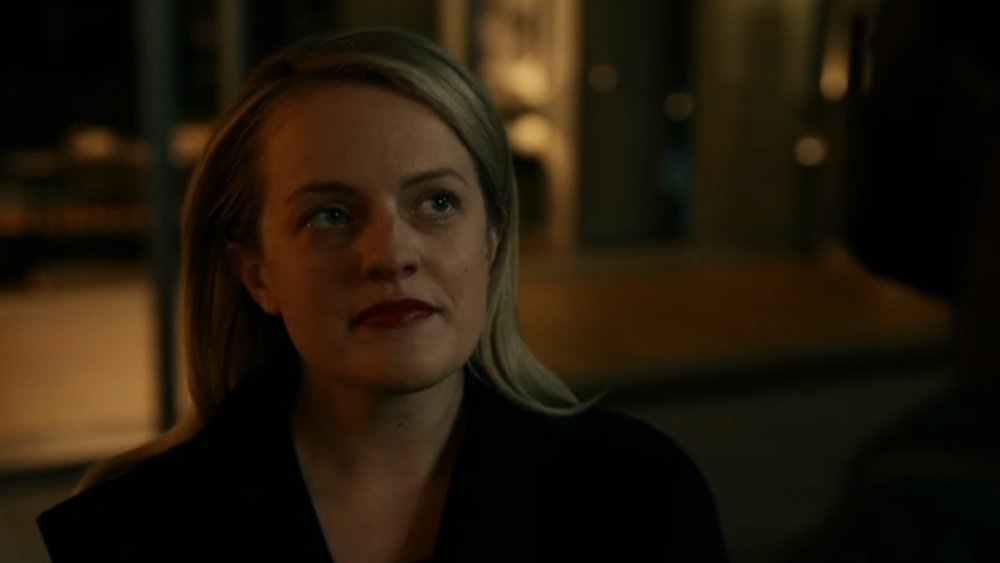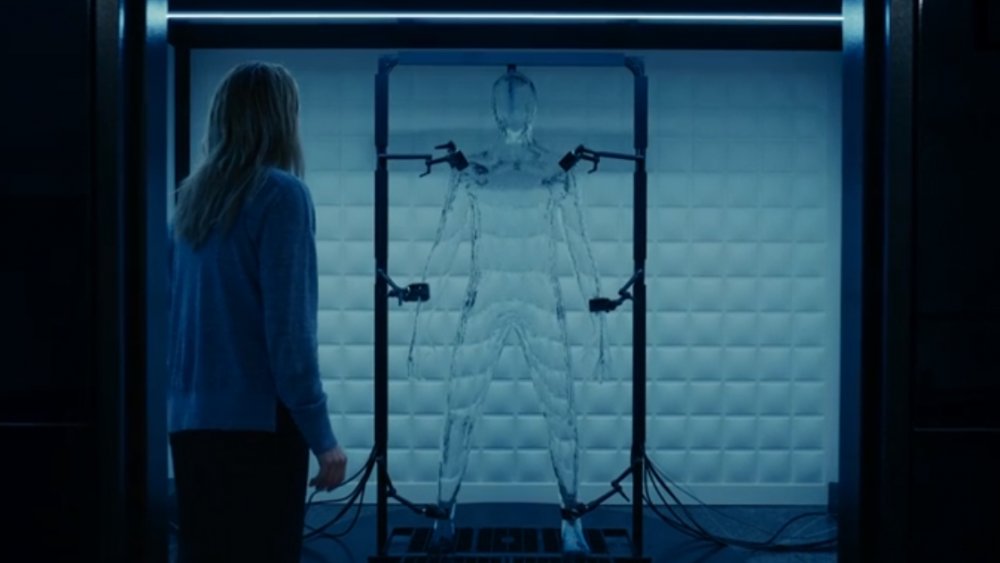The Biggest Unanswered Questions In The Invisible Man
Written and directed by Leigh Whannell, The Invisible Man is a rock-solid thriller — beautifully shot, smartly written, and above all, scary as hell. Elisabeth Moss plays Cecilia Kass, a woman who escapes from an abusive relationship with a dangerous man named Adrian (Oliver Jackson-Cohen). As Cecilia tries to move on with her life, she feels Adrian's presence everywhere, even when he's nowhere to be seen. As Cecilia begins to suffer a series of strange, inexplicable misfortunes, she starts to suspect that Adrian has discovered a way to become invisible, and that he's never going to let her be free.
A major reason why The Invisible Man is such a captivating film is because of the way it expertly withholds information. However, this sparse and inscrutable approach also means that, when the film is over, some of its mysteries are never fully resolved. Today, we'll be breaking down all of the questions that the film never gave us answers to, to see if we can answer them ourselves. Sometimes these will be potentially confusing story beats, plot twists that seem to come out of nowhere, or questions that are raised but never answered. Other times, we'll be going deeper, contemplating the hidden themes that lie beneath the film's surface. By doing so, we hope to show you just how much of this beautifully layered film can end up being totally invisible if you aren't looking closely.
(Be warned — we're spoiling the entire movie.)
Who was Cecilia before she met Adrian?
Pretty much every scene in The Invisible Man is about Cecilia struggling — literally or metaphorically — with Adrian's lingering presence in her life. The film's singular focus on this one plotline is generally a good thing, since it offers the audience no escape from the constantly escalating tension. But unfortunately, it also means that there's basically no room in the film for subplots, so we don't get a chance to learn much about who Cecilia is as a person, outside of her relationship with Adrian.
In the brief moments where Cecilia is momentarily free of Adrian's grasp, we catch glimpses of a truly compelling character who we want to learn more about. When she, James (Aldis Hodge), and Sydney (Storm Reid) are just hanging out together, Cecilia is sharp, funny, and empathetic. Also, in one scene, Cecilia is suddenly being interviewed for a job at an architecture firm, the only acknowledgement we get of Cecilia having career aspirations. Was she an architect before? Did she give it up for Adrian?
Honestly, one reason why Cecilia sometimes feels like such a cipher is because even she herself might not even know who she is anymore. Trauma can make you feel like whoever you once were, that person has now been erased. You have no life outside your struggle for survival. Who was Cecilia before she met Adrian? The film doesn't answer, and we'd really like to know, but perhaps Cecilia is currently in a place where not even she remembers.
Why are Cecilia and her sister so distant?
From the moment Emily (Harriet Dyer) rescues Cecilia from Adrian's house, something seems off about their interactions. Emily is never seen comforting her sister, most of their conversations quickly turn to bickering, and most tragically of all, when strange things start happening to Cecilia, Emily doesn't take her sister's concerns seriously. One possible interpretation of their dynamic is that it's solely a necessary plot device in order for the horror of the film to function. As is the case with many horror stories, the scares can only continue if no one listens to the protagonist. But there's also a more charitable reading of their dynamic. Long before Cecilia escaped from Adrian, she and Emily were already estranged.
Think about it — the way that Cecilia's stalker drives a wedge between her and Emily is by sending a single fake email, telling Emily that Cecilia wishes she was dead. What happens next? Emily immediately cuts Cecilia out of her life. Cecilia denies that she sent the email, but Emily refuses to listen. If that email was a wildly out of character thing for Cecilia to say, you'd imagine that Emily would consider the possibility that she didn't have the full picture, and she'd listen to Cecilia's explanation. Emily's reaction only makes sense if there was already some underlying tension between the sisters that the Cecilia's tormentor was exploiting. We never get the full story about the reason for this tension, but some old wound is undeniably there.
How does Adrian's invisibility technology work?
One of the most cryptic elements of The Invisible Man is Adrian's invisibility suit itself. In an otherwise mundane and modern setting, one guy has access to an absurdly advanced piece of futuristic technology. How does this suit work, and why does no one else know about it?
As a starting point, let's look at some contemporary examples of active camouflage technology. Since 2003, tech company Tachi Lab has been working on Retro-reflective Projection Technology (RPT), a way of projecting real-time video onto irregularly shaped objects. There's also BAE Systems' ADAPTIV camouflage system, in which a vehicle outfitted with temperature-changing hexagonal panels can be disguised to look like a different type of vehicle when seen through infrared imaging. Adrian's suit is far more advanced than either of these systems, but with its numerous little cameras, projectors, and hexagonal panels, it bares some similarity to both these present-day technologies.
In terms of why no one else knows about these suit, that's difficult to say. We know that Adrian is "a world leader in the field of optics." If we assume that means he owns his own company, maybe some of Adrian's employees do know about the suit, in part or in full, but they're also under NDAs that prevent them from speaking out. Perhaps Adrian initially made the suit intending to sell it, but then decided that he was rich enough already, and that he'd much rather just use this invention himself, for fun and profit, on the weekends.
How was Cecilia impregnated?
After Cecilia is arrested for her sister's murder, a nurse meets with her and tells her that, according to a blood test, Cecilia is pregnant. The nurse says, "The test shows us that it was pretty recent. We can't be sure exactly when, but it must have been some time in the last month." So now comes an unpleasant question ... when and how did Cecilia get pregnant?
At this point, we don't know exactly how long it's been since Cecilia escaped from Adrian. Two weeks passed between when she first left and when she heard of his apparent suicide. Since then, we're guessing that at least a few more weeks have probably elapsed, if not significantly longer, perhaps even a couple months, but honestly, we're not sure. It's possible, though a bit of a stretch, that Adrian got Cecilia pregnant while they were still living together, but it's also possible that — and here's where things get real uncomfortable — he did so after she'd already left. We don't want to think about the mechanics of how exactly that would work, but given what we know about Adrian, both in terms of his immorality and his resourcefulness, it's not out of the question.
One other lingering question that the film doesn't answer, what's going to happen to Cecilia's unwanted pregnancy? We can understand why the film didn't go there, but whether or not Cecilia plans on keeping it is perhaps one of the biggest questions that the film chooses to leave unanswered.
When is the invisible man Adrian, and when is he Tom?
When Cecilia finally shoots the invisible assailant in James' house and peels the suit off him, she's surprised to find not Adrian inside but rather his simpering toad of a brother, Tom (Michael Dorman). There are a few different ways to interpret this reveal. One is that Tom really was the one tormenting Cecilia all this time, and Adrian never got his hands dirty personally. Another interpretation is that this is the only time Tom wears the suit, perhaps because Adrian is attempting to frame him, but at all other points, Adrian is the only one abusing her.
Either of these explanations are potentially defensible, but another interesting option is that, during the final invasion of James' house (and perhaps earlier), there are two invisible men — Tom and Adrian — working together simultaneously. After all, when Sydney finally confronts the invisible man in her room by macing him, he collapses to the ground, but then, a moment later, when Sydney runs out into the hallway, she's immediately knocked over. Sure, it's possible that it's the same guy, but the logistics of the scene make way more sense if there was actually a second invisible man waiting in the hallway. We know that Adrian has access to multiple suits, and don't forget, when Adrian is discovered by police the next day, his eyes look awfully red. Perhaps like someone who was recently maced?
What is the nature of Tom and Adrian's relationship?
Throughout much of the film, Adrian and his brother, Tom, appear to be in a more or less equal partnership — a unified front of awfulness. But occasionally, we get hints that their relationship might be a lot more complicated. At one point, Tom asserts that Adrian held all the power in their relationship, saying, "My brother controlled me long before he met you, Cecilia." Later, after Tom is killed, Adrian claims that the complete opposite is true, saying, "I know it didn't seem like it to the outside world, but Tom controlled me." If both brothers claim that they were the abused and powerless party in a toxic relationship, who should we believe?
We feel the evidence points towards Tom being subservient to Adrian and not the other way around. When Tom visits Cecilia in the psych ward, he tells her that they can get her out of jail if she agrees to return to her life with Adrian. This ultimatum doesn't really make sense if Tom has the power and Adrian is just a puppet. That being said, it's also potentially true that both brothers are telling the truth, at least in part. Maybe they each abused one another at various times. Or perhaps both are lying, and their claims of abuse exist solely to manipulate Cecilia's emotions. Regardless, none of this justifies the way that either of them behaves, so it also seems safe to just label them both as irredeemable jerks and move on with our lives.
Did Adrian deserve to die?
Since there's still arguably a bit of ambiguity at the end of the film regarding just how bad of a dude Adrian is, is Cecilia's decision to murder him truly justifiable?
During Adrian and Cecilia's final dinner conversation, Cecilia is wearing a wire to record their conversation. Presumably, she's doing this to attempt to trick Adrian into confessing his crimes on tape, so that she can send him to jail. Adrian, however, is evasive, and he starts trying to seduce and gaslight Cecilia all over again. This culminates with him using the phrase, "That shouldn't come as a surprise."
As Adrian says these words, a twinge of realization flashes across Cecilia's face, presumably because this has just confirmed two things for her. The first comes from how he says that word, "surprise," in his deep, raspy voice. That same word was used mockingly by Cecilia's invisible stalker as he was tormenting her, and hearing that word again in Adrian's voice presumably confirms for her that they are, indeed, the same person. Additionally, we can assume that this confirms for Cecilia that Adrian is still willing to lie to her, willing to start up the cycle of abuse all over again. Adrian truly has no remorse, no conscience, and he's never going to stop.
That was enough for Cecilia to conclude that Adrian needed to die. Does that make what she did right? Only you can answer that for yourself.
How did Cecilia get an invisibility suit?
In the end, Cecilia decides to kill Adrian by putting on an invisibility suit and forcing him to cut his own throat with a knife, in full view of the house's security cameras, so that he appears to be committing suicide. It's a shocking and gut-wrenching moment, but it also has the potential to be somewhat confusing, as the exact logistics of how Cecilia accomplished this plan aren't ever fully explained. When and how exactly did she get her hands on an invisibility suit of her own?
One option is that Cecilia is wearing Tom's suit from when he attacked James' house. However, this seems unlikely for two reasons. First, the suit was clearly damaged after Cecilia shot it to pieces. The second problem is that Tom's suit was presumably turned over to the police as evidence.
What seems to be a far more likely option is that Cecilia's suit is actually the one that she discovered earlier in the basement when she crept back into Adrian's house halfway through the film. In this scene, she peels it off a mannequin, presumably to steal it, but when she hears someone entering the house, Cecilia appears to stash the suit away in an air vent inside Adrian's closet. Later, when Cecilia claims that she's going to the bathroom during her dinner with Adrian, she's most likely retrieving the suit from the closet and using it to execute her master plan.
What's next for Cecilia?
After Cecilia's final confrontation with Adrian, the film ends rather abruptly. Even though, in this moment, Cecilia seems to have found some measure of closure, we still have endless questions about what comes next for her.
First, is Cecilia going to jail for any of the stuff she's done? She may not have actually committed her sister's murder, but she did break out of a mental hospital, and she legitimately killed both Tom and Adrian. Honestly, we think she's going to be just fine. Numerous people "saw" an invisible suspect menacing Cecilia in the hospital, which means shooting Tom was legitimately self-defense. Plus, her plan for eliminating Adrian was rock solid. And if things go bad, Cecilia also just inherited $5 million, so she can probably afford some pretty good lawyers.
Perhaps the more exciting question is what is Cecilia going to do with her new invisibility suit? Will she slip down a dark path of crime and immorality? As fun as that would be, it seems unlikely. Cecilia seems like a genuinely good egg, killing Adrian notwithstanding. We assume she's going to go back to living her normal life, as best as she's able, but she'll probably keep that suit somewhere nearby, you know, just in case. Here's hoping we get a sequel where Cecilia realizes that someone close to her is being abused, and she pulls the suit out from under the floorboards like John Wick digging up his guns, suiting up for "one last job."
What is The Invisible Man trying to say?
One of the reasons that The Invisible Man has been so critically well-received is because it succeeds on numerous different levels simultaneously. It's not just a vehicle for scares. It's also a film with a brain, full of deeper themes about trauma and abuse. But what exactly is it trying to say about these subjects?
First, in regards to trauma, the film shows us that even when the source of your pain is gone, trauma stays with you like an invisible monster. We see that this is the case for Cecilia even before the titular invisible man comes back into her new life. She's afraid to leave the house, she has trouble sleeping, and she jumps at shadows. Metaphorically, Cecilia's tormentor is a personification of trauma, an invisible force that stands at the foot of her bed at night, follows her down the street, and pulls her away from her friends and family.
And second, in regards to abuse, The Invisible Man shows us that when people come forward and claim that they're being abused, we tend not to believe them. We downplay their stories, invalidate their feelings, and call them "crazy." Pretty much everyone in the film does this to Cecilia at some point, even her sister and her friend. This film is a reminder that just because we can't see the people around us being abused, that doesn't mean it isn't happening.
Will there be an Invisible Man sequel?
As of right now, there haven't been any announcements of a sequel to The Invisible Man. Granted, in November 2019, Universal Pictures announced that Elizabeth Banks was attached to direct a new adaptation of the 1940 film The Invisible Woman, but thus far, there aren't any signs that this is going to be a sequel to Leigh Whannell's 2020 film. Banks' movie is apparently based on an original pitch of her own invention.
To be honest, we can understand why Universal might be hesitant to present that film as a sequel to this one. Thus far, all of Universal's recent attempts to build a series of interconnected horror films as part of its once promised "Dark Universe" have crashed and burned rather spectacularly. That being said, given the success of this new Invisible Man film, it seems like a potential missed opportunity to not tie these two films together, especially since the original 1940 The Invisible Woman was itself a sequel to the 1933 The Invisible Man that inspired the film we're discussing today.
Then again, the original Invisible Woman was far more of a screwball comedy than a horror film, and the involvement of Banks, a seasoned comedian, is probably a hint that her new film is going to be — at least in part — a comedy. And we're not really sure how that well that would meld with the moody world of Whannell's social thriller.

